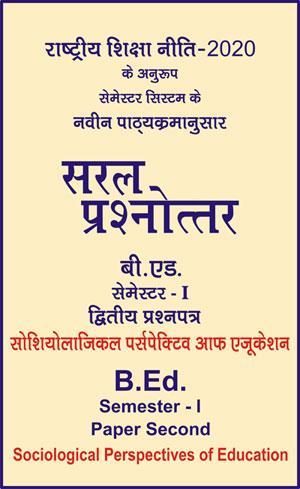|
बी एड - एम एड >> बी.एड. सेमेस्टर-1 प्रश्नपत्र-II - सोशियोलाजिकल पर्सपेक्टिव आफ एजूकेशन बी.एड. सेमेस्टर-1 प्रश्नपत्र-II - सोशियोलाजिकल पर्सपेक्टिव आफ एजूकेशनसरल प्रश्नोत्तर समूह
|
5 पाठक हैं |
|||||||
बी.एड. सेमेस्टर-1 प्रश्नपत्र-II - सोशियोलाजिकल पर्सपेक्टिव आफ एजूकेशन (अंग्रेजी भाषा मे)
Question- What is National Literacy Mission (NLM)? Discuss in detail.
Ans.
National Literacy Mission
The National Literacy Mission (NLM) is a nationwide program started by Government of India in 1988. It aims to educate 80 million adults in the age group of 15 - 35 over an eighty-year period. By “literacy”, the NLM means not only learning how to read, write and count but also helping people understand why they are deprived and helping them move towards change.
National Literacy Mission (NLM) is a nation wide program stated by Government of India in 1988 with the aim to educate people of all age group. National Literacy Mission works under the authority of National Literacy Mission Authority, an independent body of Ministry of Human Resources and Development.
Post independence, various government aided educational programmes like adult education or primary education programmes etc helped in spreading education across nation but still percentage of progress in education is not much. For the purpose of eradicating illiteracy from the face of India, Late. Prime minister of India, Shri Rajiv Gandhi initiated National Literacy Mission (NLM) programmes on 5th May, 1988.
National Literacy Mission (NLM) was set up by the Indian government on 5 May, 1988. NLM works under the guidance of the National Literacy Mission Authority, an independent wing of the Ministry of Human Resources and Development.
NLM initially had two flagship programs - “Total Literacy” and “Post literacy". The initiative was revitalized on 30 September, 1999, when they were combined as a single program: "Literacy Campaigns and Operation Restoration’.
The NLM initiated its first successful campaign in Kottayam city of Kerala followed by Ernakulam district. Up until November 2002, 596 districts out of the total 600 districts of the country had been covered under Total Literacy. 191 were in the post literacy phase while 238 were in the continuing education phase.
In 1999 UNESCO conferred upon it their Noma Literacy Prize. It received jury appreciation for the teaching material it had produced and for raising the awareness of quality primary education in schools.
NLM works with NGOs across the country, providing financial assistance for those that actively participate.
Funding
NLM releases funds for each district. While the ratio between centre and state is 2:1, it is 4:1 for tribal sub-plan districts.
Working of National Literacy Mission
In India, 81% of youths from ages 15—24 and 63% of all adults are illiterate, based on a 2005 - 2010 UNESCO study. However, the 2001 census stated that female literacy is 54.16%.
For the working of NLM, Jan Program’ was initiated with the following aims :
- To set literacy as a goal for masses.
- Present challenges among youngsters.
- Participation of women must be encouraged.
- Obtain assistance of national armed forces.
Following works form part of people's welfare programmes conducted by NLM :
(1) Obtaining Support of National Armed forces - It is duty of the National Armed Forces to facilitate encouragement and entrust running of literacy programmes in border or distant areas. With the help of various welfare organisation, armed forces provide literacy as well as commercial education programmes to family members of armed forces. For this, they can also take services of ex-army men.
(2) Obtaining Support of Employers and Labour Union - Obtain support of railway, mines, public sector firms, big or small industrial bodies and make them liable to run literacy and vocational programmes.
(3) Obtaining Support of Prison Officials - With the help of prison officials and staffs to organise literacy and commercial education programmes.
(4) Obtaining Student’s Support - Teachers as well as college management must give their assistance in eradicating illiteracy. Students must also give their support which in turn will help them in taking advantages of various vocational literacy programmes.
(5) Participation of Women is must - Women stands first in the act of social works. Various women organisations, clubs voluntary institutions can run literacy programmes under the flagship of social work or service campaigns.
(6) Providing Other Facilities - Evening classes in governmental, non-governmental offices or private organisations should be organised to facilitate vocational literacy and social educational programmes.
NLM's Core Issues : Core issues/principles of National Literacy Mission are enumerated below -
- Investment in technical education.
- Effective management and evaluation.
- Wide organisation of public collaboration and campaign.
- National commitment.
- Motivating teachers and students as well.
NLM's Working Policy - For the successful accomplishment of National Literacy Mission, nation-wide working policy was made whose key points are mentioned below -
-
Incorporating encouragement among people towards literacy mission.
-
Initiating public campaign for literacy movement.
-
Obtaining public assistance and participation through communication mediums like newspapers, radio, T.V. etc.
-
Universalization of education in every nooks and corners of the country.
-
Making appropriate changes in the current programmes by using modern technical resources.
-
Obtaining maximum assistance from voluntary organisations and making flexible rules for obtaining financial aids.
-
Continuous efforts should be made for opening and managing more and more public education centres.
|
|||||














